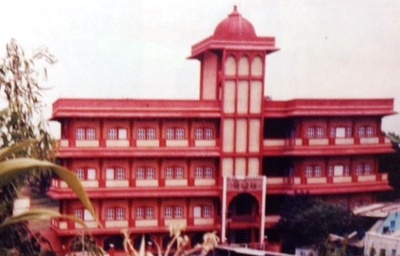Vedant University

In 1988 Vedant Vidyapeeth (university ) was instituted by Shri Datta Devasthan Trust.
This university provides for the impartment of the education and learning of the Four Vedas, Upanishads and the Shastras(precepts ).
The Vedic education system is based on the recital methodology. The Vedas accord utmost importance to the correct diction while reciting them and hence they have to be learned through a Guru. The Brahmins reciting the Vedas have to conduct themselves with a strict lifestyle comprising of stricter rules regarding their food intake and travel , their conduct and thoughts. It takes around 12- 14 years to learn one Veda. Thus to have a proper education of the Vedas the Gurukul pedagogy is required. Taking cognizance of this fact , an arrangement of 100 intellectual and truthful students is made available here. The University has made arrangement of Food, clothing, shelter and education of these students completely free of cost. To impart vedic education, the University has provided for Intelligent and virtuous Acharyas (Gurus or Teachers).
Currently the Vedpathshala under the Vedant Vidyapeeth houses 65 students learning Rigveda, Krishna Yajurveda, Shukla Yajurveda, Samveda and Atharvaveda (5 branches of Vedas). Also Nyayashastra and Vyakaranshashtra are being taught in the Shastra Pathshala(school). Vedant Vidyapeeth also has a library which consists of various Granthas( Religious texts) useful to the students. The library alongwith Vedas and Shastra Granthas , houses many books on Adhyatma, Dharmashastra, Jyotish, Upanishads, Religious books and texts by saints, Books on Grammar, History, Puranas, and Character Books to provide for diverse knowledge.
Vedant Vidyapeeth has formulated a syllabus spanning over 12 years for all Four Vedas and Vedgranthas ( Samhita, Brahamana, Aranyaka) Shadanggranthas (6 Branches of the Vedic Learning) viz, Shiksha, Kalpa, Vyakrana, Nirukta, Chanda and Jyotisha. Since Sanskrit is essential to understand these Vedic Literature, the University has also formed a syllabus of Sanskrit. Also Vedant Vidyapeeth has started examination centres at All India Level for the exams of all Four Vedas. This includes for each Veda the following 1) Shakha( Samhita, Brahmana, Aranyaka) 2) Kramanta Dashagrantha ( Shakha+ Dashagrantha) and 3 ) Jata and Ghanapatha three level degree examinations. The examinations of Vedas and Vedangas are completely on viva voce methodology.
With an aim of preserving and protecting Shastras alongwith the Vedas, Vedant Vidyapeeth , in 2015, established Vedshastraparikshan Parishad ( council for tests of Vedas and Shastras) . Sringeri Peethadheshwara Sri Sri Bharatiteertha Swami is the Head of this council. Alongwith the Vedas and its Branches, Vedant Vidyapeeth has also formed a syllabus for 5 shastras viz. Nyaya, Mimansa, Vedanta, Vyakran, and Ganita (Mathematics). This council conducts examinations of different shastras at All India level . Every 6 months these examinations are conducted in written and oral forms. This is the only centre which conducts such examinations at an All India Level. Also Scholars and Erudite Shastris and pandits are invited from all over India to preside as examiners.
According to the traditional method of Vedic Learning, in the tradition of learning of Vedgranthas( Samhita, Brahmana, Aranyaka) in Shukla Yajurveda -Shatapathbrhamana and Ashta Brahamana of Samveda , these two texts had started to recede in the vogue of time. Vedant Vidyapeeth started imparting the education of Shatapatha Brahamana. Also since these scriptures had to be by hearted Shatapatha Brahmana and Ashtabrahamana viva voce examinations were started to further the motivation of learning these texts.
This traditional and ancient knowledge was eloping in time . Of the many branches (around 1100) of the Vdas, very few are existing today and their scholars are also few in number. In earlier times this Vidya was protected by the rulers. Today it has become essential to protect this knowledge thru people support. Eternal emancipation is the thought at the roots of the Vedas. The Vedic Dharma is based on the principles of good conduct. In todays difficult times , Ghanapathi and Dashagranthi Brahamins who are striving to protect this Veda Vidya are being honoured and felicitated by the Trust. The Trust has also started a program of Ved Parayana which would motivate the students to by heart the Vedas and also Bhaktas who get this paryana done are blessed by the Lord Almighty.
To propogate the importance of Vedas and to preach the Dharma based on vedic principles, H.H. Sadguru established Satsanga Mandalas. Through the Satsanga Mandalas this work of Vedas is being carried out through the mediumof seeking religious alms. This work of Ved Vidya has come to shape through Shri Sadgurus divine force, HIS strict penance and eternal Brahamacharya and sharp wisdom. Its HIS blessings that will keep the flag of Vedic Dharma upheld in the entire universe.

